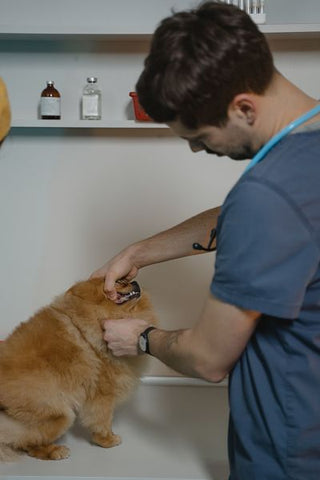No Products in the Cart
Luxury and organic cosmetics for dogs and cats ♥ Free shipping on orders over €49.99
If there is a universal truth about many small breeds including Pomeranians, it is that they are very prone to plaque, bad breath and tartar. Not only that, but double pieces and loss of them. Do you know the impact that poor hygiene and care can have on your Pomeranian's health ?
One of the issues that most concerns many owners of Pomeranians is dental care. If you do not have previous experience, you can see up close how your Pomeranian who is just a couple of years old has horrible breath , teeth that are black from plaque, or teeth that have not fallen out. It is vitally important to take action on the matter for your health, to prevent and avoid possible diseases and teeth.
What are some of the most common dental problems associated with Pomeranians?

Baby teeth that do not fall out
Dental problems in Pomeranians start as puppies , as surprising as it may seem. And when they have their baby teeth, many times they do not fall out naturally, preventing their permanent teeth from coming in correctly. In these cases, a visit to the veterinarian is necessary to be able to remove them safely. The most common teeth to suffer from this are the canines and incisors .
Double denture
If we have not arrived in time to remove a baby tooth that has not fallen out, we may find that the permanent tooth has grown equally (generally in front of or behind the baby tooth). Again, a visit to the veterinarian will be necessary, otherwise we run the risk that plaque may accumulate between those two teeth and the gums may become inflamed.
Gingivitis
A poorly cared for mouth leads to excess tartar and plaque full of bacteria . This in turn causes inflammation in the gums . Gingivitis is one of the most common problems in Pomeranians since they tend to accumulate a lot of plaque. The gums in this state are swollen , red and may bleed .
periodontal infection
When a mouth with gingivitis is not treated properly, it can lead to a periodontal infection. Plaque has turned into tartar and now builds up under the gums. As this infection progresses, the gums usually recede and the periodontal ligaments loosen so that the teeth begin to move . The gums form pockets that accumulate bacteria and in turn destroy the bone structure of the teeth. This is one of the biggest reasons for tooth loss in Pomeranians. In many cases a cleaning at the veterinarian will save the tooth, and in others it will need to be pulled out.
Broken teeth
Pomeranians have very delicate small, fine teeth. We must especially watch the toys and hard snacks that we give to our Pomeranian and that can lead to parts breaking. Antlers or horns may seem like a natural and durable option, but they are not recommended due to the large number of teeth that are being reported to veterinarians. Never let your Pomeranian eat a snack without supervision .
Bad breath
Your Pomeranian is adorable until he comes over with dragon breath. Bad breath in a Pomeranian is usually a clear warning that he or she does not have good oral hygiene, probably with some of the problems mentioned above. If your Pomeranian's mouth starts to smell bad, it is time to inspect and visit the veterinarian to remedy it.

How can you take care of and prevent all these oral problems?
Your Pomeranian's oral health is very important to his overall health and well-being. If you don't already have a grooming routine, start today to make sure you avoid or prevent some of the most common oral problems for Pomeranians.